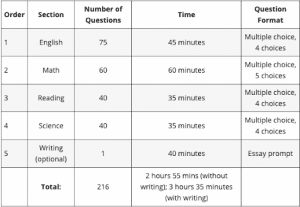What is the average ACT score at Princeton?
When it comes to the Ivy League schools, Princeton University stands amongst the most prestigious and elite options within the already prestigious group of schools. In fact, Princeton is one of the three schools that make up the “Big Three,” with the other two being Harvard and Yale! If you’re dedicated to getting into Princeton, you’re probably asking yourself, “What is the average ACT score at Princeton?” After all, the standardized test scores still play a massive role when it comes to who gets into – and who is left out – of schools like Princeton and the other prestigious schools in the Ivy League.
So, if you are interested in learning about what ACT scored you’ll need to get into Princeton, as well as many other important factors that will play a role in the selection process, then you have absolutely come to the right place! Let us at AdmissionSight break everything you’ll need to know about Princeton and what it expects out the students who what to go there.
Let’s get started!
Princeton’s average ACT score
Overall, there are three critical numbers that admissions officers are going to look at when it comes to students who get accepted. Those three numbers are a student’s grade point average and SAT or ACT score.
When it comes to the ACT specifically, the average score for students who get into Princeton is 34 out of the perfect score of 36. Moreover, the 25th percentile ACT score at Princeton is 32 and the 75th percentile ACT score is 35! That means that if a student gets a 32 or lower, that student is going to have a score that is below the typical accepted number. The opposite can be said about students who earn a 35 or higher.
Just from that, you can easily tell how truly competitive Princeton is. For that reason, students who are dedicated to getting into Princeton – or really any school of a similar level of competitiveness and prestige – are going to have to work as hard as they can to make that dream become a reality.
While there is no doubt that getting into Princeton is an incredibly daunting task, there is no question that it is in fact possible. After all, most things that are very difficult are very worth it!
Last year, the acceptance rate at Princeton was just 4.0 percent. 1,498 students were accepted out of over 37,000 total applications. When it comes to students who have been accepted, here are some of the fantastic words students have to say about attending the school.
“The courses, faculty, resources, and community here are all wonderful,” one Freshman student said last year. There is truly a culture throughout the university of caring about the students and doing everything possible to help them succeed. The academics are, of course, extremely challenging, but there are plenty of ways to get help and the academic faculty are always very receptive to students needing assistance. Most everyone has the drive to succeed without creating an overly competitive or cutthroat environment. Culture outside of academics – arts, music, clubs, sports – is vibrant as well.”
From that alone, it should be clear just how special an experience of studying at Princeton can be! So, any student who is interested in attending Princeton and would rather take the ACT over the SAT, owe it to themselves to prepare as best as they can for the test itself.
Here is everything you need to know about preparing for the ACT as best as possible.
Familiarize yourself with the structure and format of the ACT
The ACT is not a test like the typical test in a high schooler’s curriculum. That is even true for students who are enrolled in heavily competitive courses such as Honors classes or AP courses. One thing that is quite unique about both the ACT and SAT is that learning the structure, and the kinds of questions that are typically asked on the exams, is half the battle.
Overall, the ACT consists of four multiple-choice sections: English, Math, Reading, and Science. Each section contributes to the total score of 36 points and the rounded average of these four section scores becomes a student’s composite score.
Here is the breakdown of the different sections, including how many questions a student will have to ask as well as how long every student gets to complete each section.
Note: Included in the table below is the optional Writing essay test, which students can elect to take. However, the writing sample is not included in the composite score out of 36.
Learn about the different types of questions that you will face
Just like the format of the test is important to familiarize yourself with, so too are the different types of questions that are asked in the test. In fact, students who work with an ACT prep course or tutor often are told that learning the specific kinds of questions that are asked within the ACT will help them better identify the right answer!
Without a doubt, the best way to learn about these different types of questions that you will face on the day of the exam is to purchase a book (or a number of books) that includes practice questions as well as full practice exams. When you are just getting started on your ACT prep, there is nothing wrong with doing just a few practice questions per day to start to gain comfort and confidence with the types of questions that you will eventually face on the big day of the test!
Identify your weaknesses
It is really important to not just do as many practice questions and take as many practice exams as you can prior to the test day without making sure that you are learning – and improving – from that process all along the way.
In fact, a great way to get started on preparing for the exam is to take a full practice exam, give yourself the same amount of time allotted by the official exam, and then go through all of your answers and grade them. From there, you will have a fairly accurate baseline in terms of what kind of score you will be able to get without any studying and preparation. From there, you will also be able to identify which subjects, and which types of questions within those subjects, you may want to commit extra time to master.
Beyond all this, students should start looking out for patterns within each subject when it comes to their incorrect answers.
If you have not yet purchased a reputable ACT study book, enrolled in a prep class or found the right tutor for the job, you can still get started on your own preparation. Do this by taking one – or multiple – of the six free and official practice tests that are offered by ACT itself.
Once you know where you stand as an ACT test taker from this first practice test, you will be able to start crafting your strategy when it comes to how to improve across the board. Remember, you may feel inclined to focus almost exclusively on the sections that you scored poorest on. While any student should definitely prioritize trying to improve on their weaker sections, that should not come at the total expense of improving in the sections that a student feels more confident about.
After all, the worst thing anyone can do when it comes to preparing for a big test such as the ACT is to turn a strength into a weakness.
Set a target score
After a student has taken their practice exam and looked over the material to identify where they currently stand on the spectrum of scores in the ACT, they will be able to set a realistic goal for their best score when the actual test day comes.
Remember, the score that you are going to want to get to feel somewhat confident about your application to Princeton is 34. If you can earn a 35 or even the perfect 36, that’s going to be even better for your chances.
Typically, a 1-2 point improvement from you baseline after a month of rigorous preparation and studying is perfectly doable. A 6-10 points improvement within that time frame should be considered nothing more than a pipe dream.
When it comes to trying to earn better scores, here is the typical amount of preparation that students should prepare for:
- 0-1 ACT Composite Point Improvement: 10 hours
- 1-2 ACT Point Improvement: 20 hours
- 2-4 ACT Point Improvement: 40 hours
- 4-6 ACT Point Improvement: 80 hours
- 6-9 ACT Point Improvement: 150 hours or more
It is always advised that students should base their goal score on the scores that typically earn acceptance to that student’s schools of choice.
Craft your study schedule
Once a student has a score goal in schedule, it is time for him or her to start crafting a study schedule that is in line with the amount of time that they should realistically prepare for in order to achieve the score that they need.
One very important reason for a student to set a schedule as early as possible is so that they can avoid the possibility of having to cram. Just like during a high school curriculum, cramming is never a good idea. The best way to prepare for success is to divide the total number of preparation hours you think you’ll need to earn your goal score by the number of weeks you have until the day of your exam.
From there, you’ll have the hours per week that you need to be hitting the books for the ACT. This will also help you figure out how many days per week you will want to be studying, as it is much better to break down eight hours of studying per week into four two-hour blocks as two four-hour blocks. After all, every student who is preparing for the ACT is also going to have to focus on their high school curriculum as well.
Consider signing up for a prep class or with a tutor
Here at AdmissionSight, we offer our students ACT and SAT tutoring options for a really important reason: one-on-one preparation is often the very best way to prepare for high-pressure moments like standardized tests. Tutors offer the experience and expertise that many students need in order to do their best. Tutors are also able to see any blind spots that a student may miss themselves, giving them the best chance to succeed as possible.
However, there’s no reason why tutoring should be the only option. It can also be really beneficial for students to enroll in an ACT course. First off, the classes are led by fantastic teachers who also have a lot of knowledge and can offer tons of help. Beyond that, you will get the chance to meet other students who are also preparing for the ACT. From there, you may all have the option of helping one another out to prepare in the best way possible.
Beyond that, there is nothing wrong with simply preparing on your own! That is definitely the most common option for the vast majority of students, some of whom end up doing really well on the ACT.
In the end, whether it is preparing on your own with a study guide, learning in an ACT course, or learning one-on-one with a tutor, students have to take on the responsibility themselves to make sure that they are setting themselves up for success.
Take as many practice exams as you can
In the end, the best way that anyone can prepare for the ACT is to familiarize themselves with the essential test content in all four ACT subjects. The best way to do that is to take as many practice exams as possible over a logical time frame.
What this means is that during your weeks of studying leading up to the exam, you should regularly take practice exams. This will not only help you prepare but will also give you a good idea of how well you are progressing towards your goal score. Remember, don’t become too overconfident after one great test exam or too discouraged after one disappointing one. What matters most is that you are gaining experience working within the guidelines of the exams as well as gaining comfort and confidence overall as well.
One final thing about taking practice exams, however, is that you should not be taking too many in the few days directly before the day of your exam. In the final three to five days before you are actually going to take the ACT, you should be mostly focused on eating right and getting the sleep you need to perform at your best on the day of the exam.
What it takes to get into Princeton
While getting a great score on the ACT can have a big impact on a student’s ability to earn a spot at Princeton, it is far from the only thing that the school is going to consider. Students need to make sure that they are excelling in their courses, ideally courses that are challenging, such as AP and Honors courses.
Moreover, students will want to commit to impressive extracurricular activities that they are passionate about and committed to. Finally, making sure that you actually master the application process, craft fabulous personal statements and supplemental essays and let the admissions officers at Princeton know who you are as a student and as a person outside of the classroom, you’ll be giving yourself the best chance to succeed.
In the end, all this comes down to is finding a way to convince Princeton that you become a positive and impactful member of the community on campus and beyond!
We can help you beat the Princeton University ACT score
Whether test-taking is a strong suit or a weak point for you as a student, you owe it to yourself to do the very best so that you can prepare. We not only offer tutoring for our students, but also a comprehensive approach to mastering the high school years, as well as the application process to end up in the school that you have always dreamt of going to.
Here at AdmissionSight, we are incredibly proud of the fact that 75 percent of the students that we work with get into either an Ivy League school or a top-10 school elsewhere in the United States. If you are interested in becoming part of that incredible record of success, then reach out to us today and get started on your own journey to college admissions success!









































